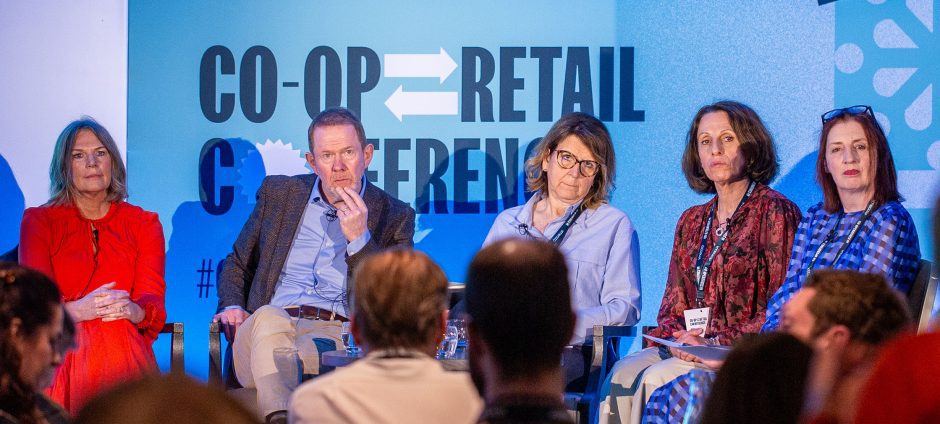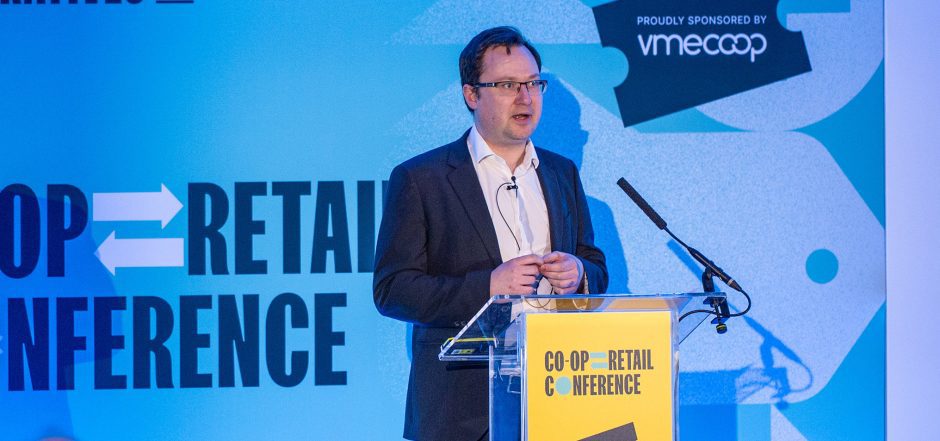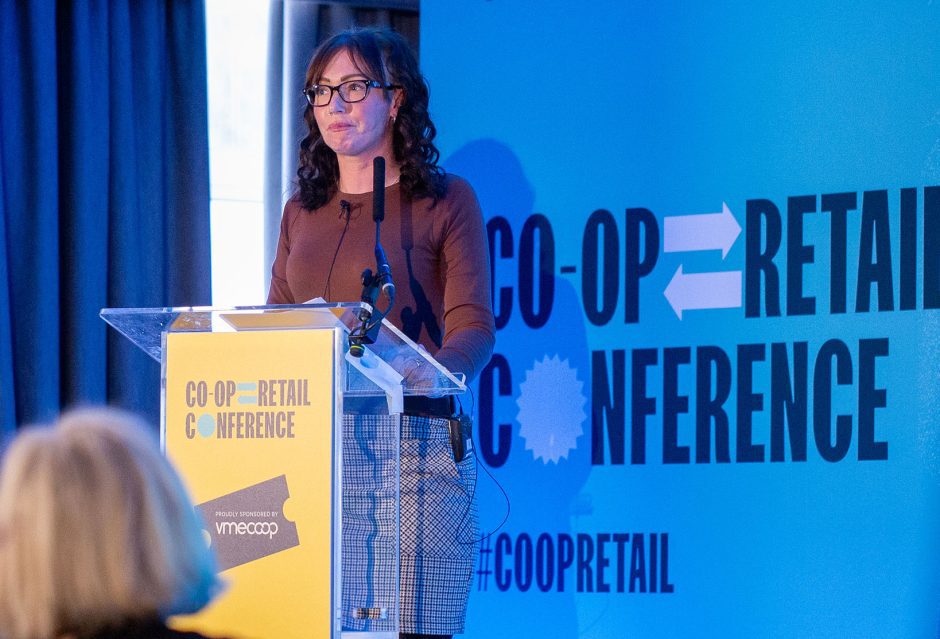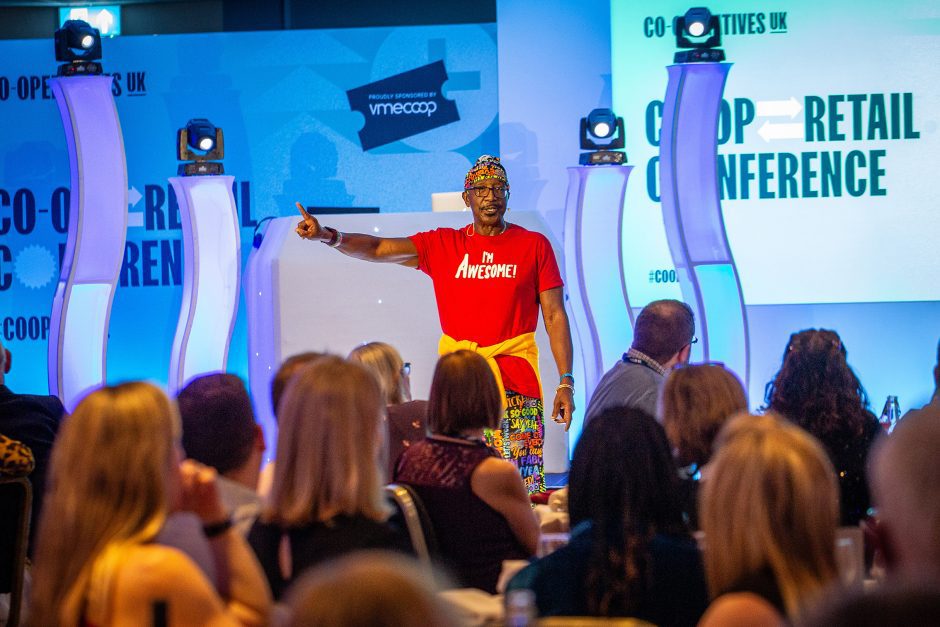With the UK still in recession and the cost of living crisis not abating any time soon, the sight of co-op retail leaders coming together to share ideas and successes with a genuine air of positivity and collaboration was a welcome one – despite the clear challenges.
The annual Co-operative Retail Conference is hosted by Co-operatives UK, whose CEO Rose Marley highlighted at the very start that “the whole point of bringing together everybody in one room is to bring together that spirit of co-operation”. That spirit was well in evidence.
As in previous years, the 2024 event opened with a broad overview of the UK grocery market presented by the Institute of Grocery Distribution (IGD). Covid-19, the cost of living crisis and inflation all impacted growth figures, with three years of successive volume decline said IDG senior business analyst Patrick Mitchell-Fox. But while the “craziness isn’t quite out of the system yet,” IGD forecasts that things will level out longer-term, he added.
Looking to the future, IGD expects the discount and convenience sectors to again see the highest growth, with supermarkets and hypermarkets declining – largely because the focus has shifted from opening big stores to smaller store formats.
But Mitchell-Fox said co-ops should be mindful of the fact that the discounters (Aldi and Lidl) and the big four supermarkets (Tesco, Asda, Sainsbury’s and Morrisons) are converging in terms of products and processes; the big four are introducing price matching and member pricing, and are increasing store efficiency – an area the discounters traditionally led. Saving money through “becoming more like a discounter operationally, gives bigger supermarkets the ability to cut prices,” he said.
Over the last few years there has also been a “step-change” in loyalty card transactions, particularly in conjunction with member pricing. And parallel to member offers, another big change in retailer–customer communication is the growth of retail media networks – retailer-owned digital spaces showing paid-for adverts.
This shrinking gap between discounters and the big four – backed up by new digital marketing channels – could prove a challenge for co-ops, he said, which will need to rearticulate their difference if they want to retain or grow their market share.
CEOs look to the future
Throughout the weekend, there was a sense of taking inspiration from the movement’s heritage to shape the years ahead; 2024 marks 180 years since the Rochdale Pioneers opened their store on Toad Lane and, to mark the anniversary, funds raised from the conference’s gala dinner will be used by the Co-operative Heritage Trust to support education about co-ops in schools.
In a video message, the Co-op Group’s new chair, Debbie White, described how the organisation’s new vision – ‘Co-operating to create more value for our member-owners, every day’ – “draws on our past to support our future.”
The Group’s new strategy “places our member-owners at the heart of everything we do,” said White. “This value is created in three ways: economic value that we return to [members] when they buy our products and services; social value when they get involved in our community activities or ethical commitments; and ownership value when they get to have a say in how our business is run.”
This was echoed by Group CEO Shirine Khoury-Haq, who revealed the organisation is launching a PR campaign this summer, to “reintroduce the concept of co-operating and member-ownership”.
Related: Report from the UK credit union conference
“All the noise [the Group has] made so far has been around the economic side,” she said, because, in her view, what comes next needs “a solid foundation based on commercial interaction”. She added: “The ownership element [of membership] is less understood. And given the political and societal times that we’re in, where so many people feel disenfranchised, this concept of ownership in organisations that have such an impact on social change […] needs to be highlighted for people to understand the real value of becoming a member of a co-operative. We’ll be bringing [this campaign] to the other societies as well.”

Khoury-Haq was speaking in a session bringing together some of the sector’s CEOs, alongside Alison Hands (Lincolnshire), Debbie Robinson (Central) and Phil Ponsonby (Midcounties).
Robinson welcomed the PR announcement but added: “Perhaps people don’t know enough about co-ops because we’re not relevant enough in their lives. This is a really big challenge for us. We exist because we offered ordinary people a fair price for food. Now everybody else is doing that and everybody else has adopted all of the great pioneering and leadership things that co-ops have done […] We need a new agenda, we have to be active, we have to campaign and we have to create systemic change again, just like we did 30 years ago with the Fairtrade movement.”
She added that at the pre-conference CEO and president’s gathering, it was suggested a new induction programme be developed for all co-operative colleagues, “so every co-operator has a standard that they operate from the minute they join a co-operative society.”
At a similar CEO panel at last year’s conference, there was a commitment from retail societies to explore ways of working together – while being mindful of competition law. Khoury-Haq said that over the last 12 months “great progress” had been made in areas such as buying, distribution, transparency and information sharing, but that other areas were hampered by the use of different systems and processes and the urgent need for each business to improve its financial, operational performance.
“It’s the most interesting of times and the most challenging of times, and there’s a level of tenacity needed,” said Hands. “You have to keep remembering the end point – and sometimes it means you’re not there yet, but you can’t lose sight of it […] I’m incredibly proud to work for a movement that wants to influence change.”
This was echoed by Ponsonby. “I’ve been in the co-op movement a long time, and I’ve never felt more positive about co-operation,” he said, adding that collaboration is “a natural part of what we do,” not a formulaic approach. “One of the real highlights of recent collaboration has been working together as one movement to tackle retail crime.”
RETAIL CRIME
Retail crime was the subject of a full session at the conference, bringing together speakers with very different experiences of the issue: a store manager; a former perpetrator; a support charity; and the shadow minister for policing.
“Crime is something that our colleagues on the frontlines face every single day. It’s also a topic that has brought together our societies to speak with one voice,” said Co-op Group’s Paul Gerrard, who chaired the panel.
He highlighted the need for the right intervention for the right person, from addicts to organised criminals. Thoughtful interventions can be transformative, he said, but acknowledged the need for “swift and effective justice” for escalating criminal activity, along with “a pre-emptive approach to diverting young people from the process of criminalisation”.
Related: Report from the UKSCS conference
Jasvinder Mehmi, a store manager at Central Co-op, has witnessed first hand her colleagues facing regular threats, violence and abuse. “We have had colleagues spat at, threatened with knives, and sprayed with petrol and a lighter held up near them,” she said.
Mehmi has seen shoplifters walk into stores, fill their bags and walk out without paying. “These are not people who are stealing small amounts of items to feed themselves or their families [and] they are no longer deterred by our colleagues working near the items that they are stealing. Instead they make comments like ‘I will take what I want, when I want, and you can’t do anything about it’. Incidents like these have a lasting impact on colleague wellbeing.”

Alex Norris, Labour / Co-op MP for Nottingham North and shadow policing minister, has spearheaded the Co-op Party’s attempts in Parliament to change the law in the interest of protecting retail workers.
“The brutality and impact of these crimes, even in the retelling as an individual story, is incredibly powerful,” he said. “But as saddening, is the sense that it’s just what happens at work. And that is not acceptable […] It behoves us to come together as a movement across retail management, staff, trade unions, with the Co-operative Party, to change the law to the best degree we can.
He applauded the actions taken across the co-op movement that have resulted in a change in the law, making the aggression and attack towards the retail worker an aggravating factor in sentence, but warned that more needs to be done to tackle the root causes of retail crime: the cost of living crisis; drug and alcohol addiction; and organised crime.
Amy Bond is the COO at Causeway, a modern slavery and criminal justice support charity. “We’ve been looking at the entire cycle of crime – not only the victims of crime, but the perpetrators of it, too. And the longer you spend in this space, the more you realise the societal narrative of victims of crime on one side of the fence and perpetrators of crime on the other doesn’t exist – more often than not, the two are very interchangeable.”
More than 90% of those incarcerated are themselves the victims of trauma, usually within their childhood or early adolescence, she added.
Causeway has been running a pilot project with Midcounties, and also runs a deferred prosecution model in Merseyside, which has seen reoffending rates drop from around 24% to 4% through conducting a holistic person centred assessment. A similar programme – Offender to Rehab – has been running in the West Midlands, supported by Central Co-op.

One person to successfully come through Offender to Rehab is Caroline Best, who shared her moving story to a standing ovation. Best, who used heroin and crack cocaine from the age of 13 to 35, had been in prison 21 times and was given just weeks to live before joining the programme. Now clean for six years, she has learned to drive, reconnected with her son who had been removed at birth, achieved several qualifications and now works for the rehabilitation centre that supported her.
“I was that shoplifter that Jas[vinder Mehmi] spoke about, using any ways and means to get the next fix,” she said. “Addiction is a lifelong disease, but ongoing support and not being written off by society make all the difference.”
SUSTAINABILITY
“Nature is our biggest ally in the fight against climate change,” said Lindsey Chapman, climate, culture and wildlife presenter for TV and radio, “and the actions that we take now have a huge impact both on our natural world, but also on ourselves in the years to come.”
Chapman, who chaired the sustainability panel, said two thirds of co-operatives are taking action to reduce carbon emissions, compared with 30% of UK FTSE 100 companies.
Mike Pickering, head of sustainability at Midcounties Co-op, described how the organisation consciously puts sustainability at the heart of everything it does, “from our purpose, throughout all of our operations.” The society focuses on both reducing emissions and contributing additionality to the grid. But importantly, he added, “a lot of the things we do is as a result of the collaboration and sharing of best practice we’ve had with other co-op retail societies.”
Southern Co-op CEO Mark Smith explained how his organisation’s sustainability journey “began in 2016 when we ascribed to the UN Sustainable Development Goals as a business – and in particular goal 13 (climate action)”.
Southern announced a commitment on greenhouse gas emissions in 2020 “after a lot of work behind the scenes”, and also supports nature recovery, working with local actors such as the Hampshire Wildlife Trust.
Also sharing his story was Mike Taylor from Emerge Recycling, a social enterprise which runs a sustainable recycling service in the Greater Manchester area.
Unicorn Co-op – a grocery retailer in Chorlton, South Manchester – was founded in 1996 by a group of people “who understood that what we consume has a huge impact on the world that we live in,” said Debbie Clarke, one of Unicorn’s 52 worker-owners. “In many ways, our diet shapes our world. Agriculture and the way you use land is a vast contributor to the ecology of the planet.”
She explained how Unicorn deliberately keeps waste to virtually zero, “by ordering very conservatively, and discounting early and heavily.” Unicorn does crop planning with its growers, and also has an in-house kitchen. “A really skilled team of greengrocers working with a really skilled team of cooks means you can pre-empt waste. If we see that something is not selling quickly enough, we can divert it up into the kitchen well within date.”

DIVERSITY
Last month, Co-op News heard from Diversity in Retail’s (DiR) Joanna Aunon, who previewed her session on diversity. “By working together, we can amplify and make change happen faster,” she told delegates at the conference.
DiR’s work began with gender, and now also includes race and ethnicity; recently, DiR and Women in Retail, Hospitality, Travel and Leisure (WiHTL) together launched the Ethnic Future Leaders programme, which aims to improve ethnic diversity in leadership by identifying and then working with high-potential employees from diverse ethnic backgrounds to support their progression into more senior roles.Someone who has first hand experience of the programme is Sunni Stewart, store manager and inclusion champion at Central Co-op. She said the society’s commitment to an inclusive environment where everyone belongs meant her “voice is heard and amplified.”
“Our catchphrase is ‘We are the difference makers’. We have embedded that culture for everyone, and it really makes a difference for our colleagues,” she said.
Stewart was joined by Central’s chief people and customer officer, Sarah Dickins, who shared Central’s plans of getting all 7,500 colleagues engaged in EDI.
HEALTH AND SOCIAL CARE
Making a difference was a theme heard throughout the conference. In a panel convened by Cheryl Barrott – attending the conference for the first time in her capacity as new chair of Co-operatives UK – delegates heard how different co-operative approaches in the health and social care sector can benefit everyone in what is currently a broken market.
Joining online from Barcelona, Suara Co-operativa’s director of operations, Jordi Blanco, described how his organisation uses its four decades of experience in the field of care to “respond to people’s entire life cycle”.
One of the co-op’s initiatives is its Alilura, technology which “promotes the autonomy and peace of mind of elderly people and their families by installing a non-invasive digital support environment in their homes”. Similar to a plug-and-play Zoom meeting, the service offers company, fun and therapeutic activities (such as exercise, cultural activities and celebrations) to the people who use it.
Also sharing experience from Europe was Diego Dutto, national director of Legacoop, the national federation for co-ops in Italy – a country with its own laws around social co-operatives.
He highlighted that one of the important roles of social co-operatives in Italy was addressing stigma and institutionalisation – partly because “co-operative care models prioritise social equity over market forces”.
But Italy’s care system is modular, with some services funded privately, and others publicly, he explained. “There is a big challenge here around providing care for vulnerable populations,” particularly as the government has “limited ability” to provide adequate care due to funding constraints and a lack of resources, particularly for mental health services.
The complications of a care system underpinned by a mix of public and private funding and delivery was also highlighted by the Co-op Group’s Paul Gerrard, who added that in the UK, the sheer size of the problem added to the challenges.
“The scale here is huge,” he said. “1.3 million older people request care each year, but only 41% receive it. Four in 10 hospital beds are held by people who need care. This isn’t a system that is in good shape […] Whoever the new government is, they are going to have to face into social care. There’s an opportunity for the co-op movement to become part of the solution.”
One often-cited success story in the UK is Equal Care Co-op, a registered, multi-stakeholder co-operative in the Calderdale Valley, West Yorkshire, delivering a digital care and support platform that gives voice and power to the givers and receivers of care.
This platform “empowers members to support each other through personalised care,” said founder Emma Back, describing how co-ops can address “the disconnect between the understanding of fully met needs and the reality of care workers’ expectations”.
ARTIFICIAL INTELLIGENCE
“Many of you will have heard me say this before: I truly believe the future is co-operation,” said Co-operatives UK CEO, Rose Marley. “But in the future, some things we may have to co-operate with may not be human.”
Marley was opening the final session of the conference on artificial intelligence, which encouraged delegates to give their opinions on AI and suggest actions they would like to see from Co-operatives UK.
Professor Andy Miah, chair in science communication and future media and the University of Salford, described how AI developments marked “a new era of consumer culture, a new approach to software development and a new kind of digital future”.
TikTok is now a major shopping platform, he said, and for retailers, it will be crucial to understand “the ways in which these spaces become magnets for a whole range of cultural experiences, and the impact they have on both the retail expectation, but also the places that people in habits to experience these products, these aspects, these communities.”

Animorph is a worker-co-op that aims to use AI to create next-generation software to enhance human potential. Worker-owners Szczepan Orlowski and Mario Morva described some of the technology they are is using to develop tools that “focus on unmet needs”.
And Mike Brough, head of data, analytics and insight at Central Coop, described how the society has used AI to develop a single chatbot interface for all colleague queries and information access. “We’ve got information everywhere,” he said. “And imagine if we can develop a single place where all of our colleagues went to understand what policies we’ve got in the business, how to build a training plan, how to write a business case or summarise documents.”
Central is also “looking at how to use AI to understand how members and customers feel about the business” and using machine learning to predict when its members next shop to help reduce churn.
AI has the potential to be game-changing for the way co-ops work, he said, but also acknowledged the risks. “We have to be aware of the security, reputational and financial risks – and in terms of ethics, ensure that data is well governed and any AI is used responsibly for colleagues, members, customers and the communities we serve”.
CO-OP PARTY UPDATE
Joe Fortune, general secretary of the Co-operative Party, gave delegates an update on current campaigns and their impact, including co-operative sector growth; community-owned energy; local community ownership and high streets; and retail worker violence and sector crime.
He reiterated Labour’s pledge to double the size of the sector. “We fundamentally believe in what we’re doing, so why don’t we want to see a rapid and huge expansion of it?”
“We are moving to a place of opportunity [and] we have a responsibility, I believe, on behalf of the co-op movement to have a real go and take these opportunities, because they don’t come up too often.”

